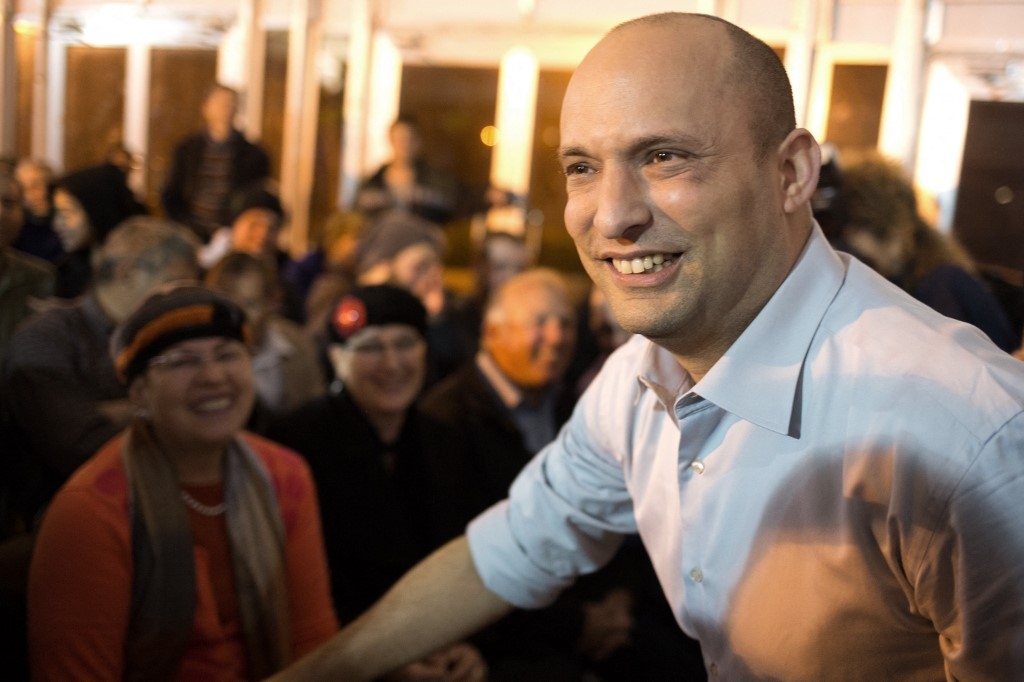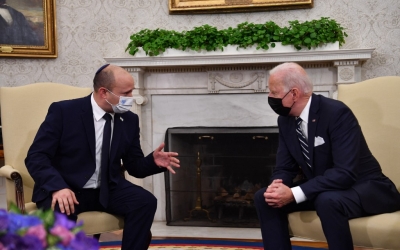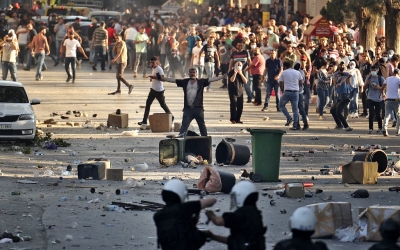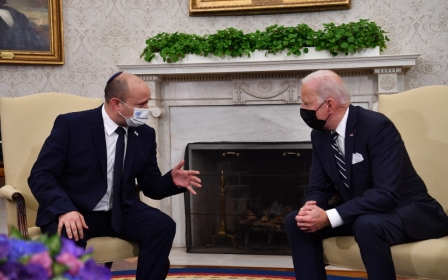Israel-Palestine: 'No war, no peace' apartheid is Bennett's best case scenario

“There is no diplomatic process with the Palestinians, nor will there be one,” said a source close to Israeli Prime Minister Naftali Bennett last week after his defence minister, Benny Gantz, met with Palestinian President Mahmoud Abbas.
Thus is Bennett’s spiritual world revealed: a world in which Israel, and only Israel, exists, and where the Palestinians will never, under any circumstances, even if they change their positions, be able to attain equality with Israelis and negotiate with them as equals. There is a word for that: racism.
New MEE newsletter: Jerusalem Dispatch
Sign up to get the latest insights and analysis on Israel-Palestine, alongside Turkey Unpacked and other MEE newsletters
Nearly a decade ago, Bennett entered national politics after serving as director-general of the Yesha Council, the leading settler institution, although he himself was never a settler and doesn’t live beyond the Green Line. In a now-famous interview, he said: “The Palestinian problem is like shrapnel in the butt.”
Today, his approach has not changed, although as prime minister, he may express himself less bluntly, as he admitted just before taking office in early June.
Bennett expressed this approach in an interview he gave the New York Times ahead of his recent trip to Washington. “This government will not annex, nor establish a Palestinian state, everyone understands that,” he said. “Israel will continue the standard policy of natural growth [of West Bank settlements].”
In saying this, Bennett became the first Israeli prime minister, with the possible exception of Golda Meir in the years prior to the 1973 war, to propose what amounts to apartheid as a political platform.
Permanent status quo
It is true that the policy of “managing the occupation” is almost as old as the Israeli occupation itself. In February 1973, for example, then-Defence Minister Moshe Dayan said, “We must plan ahead for our actions in the territories [conquered by Israel in June 1967] … so that a situation of ‘no war and no peace’ will not be unbearable for us… Authority for deciding on what happens from Suez to the [Mt] Hermon is in the hands of the Israeli government. We will not idly delineate boundaries for our settlements nor be threatened by smouldering embers.”
But the philosophy Dayan articulated then still exists and every prime minister since, except perhaps Yitzhak Rabin - whose assassination makes it impossible to know whether he meant to break the mould - has adopted it with different variations: “No war, no peace” or, in other words, a continuation of the status quo. Seven months later, the “smouldering embers” that Dayan dismissed had become the firestorm of the October 1973 war, with thousands killed on both sides, forcing Israel to subsequently return the Sinai Peninsula to Egypt.
Bennett basically said that this status quo of 'no war, no peace' is not an interim situation, but rather the permanent situation
But Bennett has gone one step further. Even Dayan called the territories occupied by Israel a "deposit" to be returned in exchange for a peace agreement meeting Israel’s needs. Since the 1990s, Israeli prime ministers have been discussing, at least officially, support for the two-state solution, including Ariel Sharon and even Benjamin Netanyahu, who adopted the Palestinian state idea in his 2009 Bar-Ilan speech. In 2020, he also accepted former US President Donald Trump's "deal of the century" which included the establishment of a Palestinian state, however crippled and fragmented.
In his New York Times interview, however, Bennett basically said that this status quo of “no war, no peace” is not an interim situation, but rather the permanent situation to which he aspires.
In this situation, Israel, on the one hand, will continue its military rule over the Palestinians in the West Bank and the Gaza Strip, and continue to accord Jewish citizens in the West Bank preferential rights as compared with Palestinians.
On the other hand, Israel will not accord Palestinians civil rights equal to those of their Jewish neighbours as would be necessitated by a partial or full annexation of the West Bank. This approach also has a name – apartheid – and Bennett believes it to be the only one possible.
'Shrink the conflict'
We don’t know precisely what was said in Bennett’s discussions with President Joe Biden and Secretary of State Antony Blinken, but publicly at least no American reservations were heard about Bennett’s positions. Nor did the Jewish centre-left parties in Israel like Labor and Meretz, which are part of Bennett’s coalition, voice any protest. This is a dangerous precedent.
But it would be overly simplistic to say that the Bennett government will be more rightist or more violent toward the Palestinians. The opposite might be true.
First of all, Bennett came into office from a position of political weakness. He heads a small party with six Knesset seats out of 120, and most of his coalition members are more leftist than he is - at least for Israel whose Labor Party positions toward the Palestinians would be considered right in Europe.
And there’s more. Bennett himself, along with his coalition partner, Gideon Saar, who had been a senior Likud figure and a leading candidate to replace Netanyahu, has changed his attitude considerably to the Palestinian question.
As the present government was being formed or immediately thereafter, both Bennett and Saar appeared to have relinquished the idea of Greater Israel and/or annexation, partially or wholly, embracing instead the new political concept of “shrinking the conflict”. The term originated with Micah Goodman, an Israeli of American extraction living in a West Bank settlement, whose books on the conflict have become bestsellers.
Goodman argues that the left in Israel has failed to bring an end to the occupation or to establish an independent Palestinian state, whereas the right failed with its idea of Greater Israel. Therefore, instead of talking about ending the conflict or continuing with the status quo, ways should be sought to “shrink the conflict”: to enable the Palestinians to manage their own affairs as independently as possible, while leaving “security” to Israel. After the conflict has been “shrunk,” says Goodman, it will be possible to discuss a permanent solution.
For a decade, Bennett pushed for annexation, but when the UAE and Bahrain signed the Abraham Accords in 2020, he realised it was impossible.
Goodman was an adviser to Saar and is considered to be close to Bennett. His influence was perceptible in an interview Bennett gave before taking office. “My approach is to shrink the conflict,” he said. “Where it is possible to have more crossings, better quality of life, more business, more industry, we will do it.”
For Bennett, this is a considerable shift. When he entered national politics in 2013, Bennett presented a detailed plan for the annexation of Area C, which is 60 percent of the West Bank. Over the years, he criticised Netanyahu and the Israeli army for not being aggressive enough toward the Palestinians and not “decisive” enough with Hamas.
For a decade, Bennett pushed for annexation, but when the UAE and Bahrain signed the Abraham Accords in 2020, he realised it was impossible. He also understood that a “final resolution” of the conflict by achieving a victory over the Palestinian so crushing that they would relinquish their national aspirations was also impossible. Thus, his adoption of the idea of “shrinking the conflict” is coming from failure and weakness, even if he refuses to admit it.
Israeli right in crisis
Bennett, then, reflects the situation of the Israeli right. On the one hand, he sanctifies the status quo and has no desire or intention of relinquishing the occupation or ending apartheid. On the other hand, the right is gradually losing its faith in its own power to shape the Israeli-Palestinian reality as it sees fit.
The fall of Netanyahu should be viewed in this context. Under Netanyahu, the right in Israel was united in a coherent, homogeneous bloc. The internal contradictions on the right, which Bennett represents, led to the fragmentation of this bloc and the establishment of a mixed government that contains elements of both right and left, including the United Arab List, an Palestinian-Islamist party headed by Mansour Abbas.
Outwardly, all of these changes have not affected the situation on the ground. The occupation, and the settlements, continue. The political discourse in Israel remains stuck, in the best case, or else propounds Bennett’s thesis of “no peace, no war”. Israel is so strong – militarily and economically – that something significant would have to happen in order to threaten its control of the Palestinians and its power in the Middle East as a whole.
But at the same time, one cannot ignore the cracks. The ideological right in Israel is in trouble and the question is how and whether the radical left in Israel, or even more so the Palestinians, can turn that to advantage.
“Where there’s a crack, we have to make it a fissure, and where there’s a fissure, we have to make it a chasm,” a left-wing anti-occupation activist told me. Maybe that approach really will accomplish something.
This article is available in French on Middle East Eye French edition.
Middle East Eye delivers independent and unrivalled coverage and analysis of the Middle East, North Africa and beyond. To learn more about republishing this content and the associated fees, please fill out this form. More about MEE can be found here.







